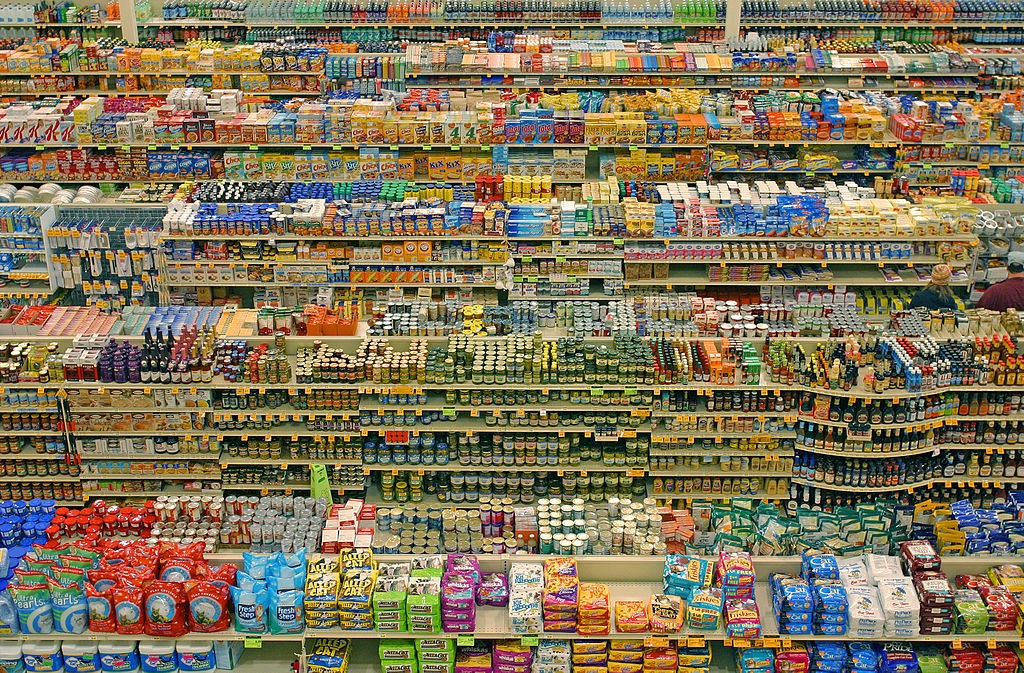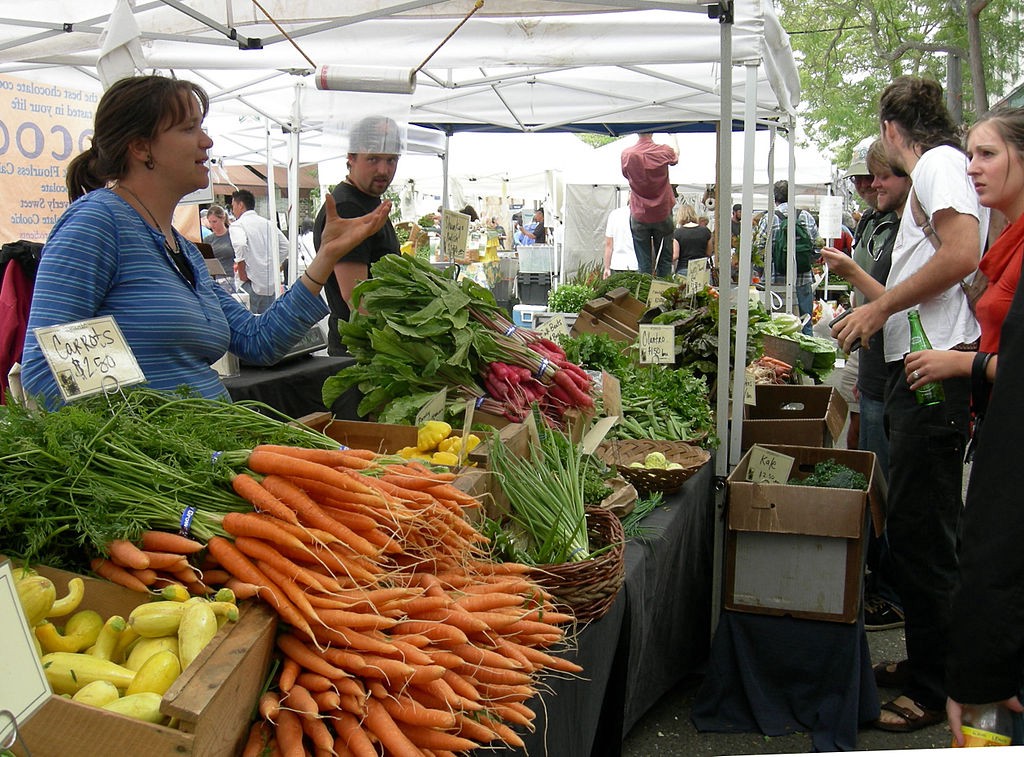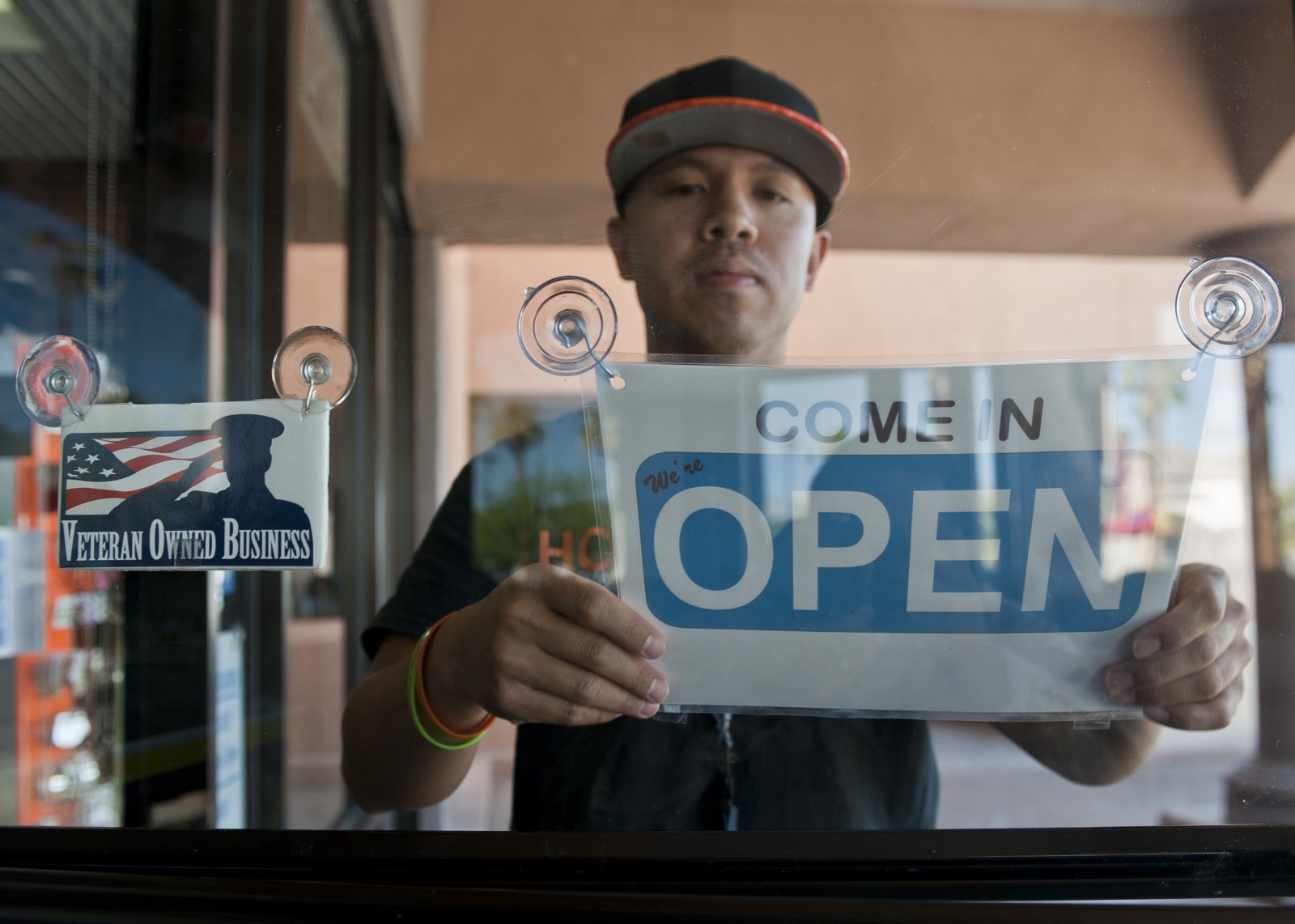Medium: Stop Trying to Vote with Your Fork

by Sarah Mock | April 15, 2019
Why We Can’t Consume Our Way to a Better Food System
Being an agriculture reporter, I hear a lot of speeches, decrees and diatribes about why people eat organic, vegetarian, or vegan, when they started avoiding gluten or dairy, or how they got turned on to pickling or kombucha. One element that drives many of these food awakenings — people saying they “realized the need” to vote with their fork. That somewhere along their path, they learned that they personally could and must act as a change agent to make the American food system safer, more just, and more beneficial to farmers and the environment, and they took pride in doing it on every trip to the grocery store or their favorite local farm-to-table restaurant.
This idea is not new. For over two decades, the idea of “eating for change” has been floating around, with it’s greatest proponents being the likes of Michael Pollan, who summarized the idea in a 2006 NYTimes article:
“You can simply stop participating in a system that abuses animals or poisons the water or squanders jet fuel flying asparagus around the world. You can vote with your fork, in other words, and you can do it three times a day.”
If you don’t like something about the way a food/beverage/really any kind of consumer item is made/distributed/sold, just don’t buy, the movement says, and eventually the wrong will be righted and all will be well. Essentially, with knowledge, discipline, and intention, we can consume our way to a better world.
An idea that feels breathtakingly simple, fundamentally transformative, and utterly attainable.
But is also total nonsense.
On the individual level , sure, it works. You can tell yourself that you’re excused from any guilt for animal abuse by being vegetarian/vegan, or that you are shrinking your carbon footprint by only buying local. But personal vindication is not the claim the movement makes. The movement promises systemic change, eventually to be felt by all of society. Will making these consumptive tweaks make that difference to the larger system? Absolutely not, and there’s a few reasons why.
Most people can’t or won’t “shop ethically.”
40% of American’s can’t cover a $400 emergency. The poorest 40% of American’s already spend between 20–35% of their income on food. Buying food that’s even 10% more expensive could be catastrophic to one of these households, even if it were available in many of America’s poor communities. Nearly half of all American’s simply can’t afford to “eat for change.”
All of which is not to mention that American shopping habits are overwhelmingly driven by price anyways. Even for people who have an economic choice, buying $2 onions sitting next $0.99 onions that look exactly the same (if not bigger and seemingly a “better value”) is simply a choice they don’t have the knowledge or incentive to make. Votes only work if you can get a majority, and on the current trajectory, there may well never be a majority voting for a “better” food system.
It’s impossible to know enough.
Even for the well-informed. Short of sourcing all of your food from a single local farm or group of farms and always cooking at home, you’ll never be able to truly vote “aye.” And for most American’s, that would mean cutting sugar, coffee, tropical fruits like bananas, oranges, pineapple and avocados, as well as many fruits and veggies, out of their diet. It’s not a route that even knowledgeable, well-intentioned middle-classers are opting for.
Instead, most people who care about food, health, and agriculture do a partial vote. We look out for key words in the grocery store — “natural”, “organic”, “grass-fed”, “local”, “fair trade”, and other friendly indicators like unfamiliar looking brands with farm-y or kind of “fresh hipster” labels. We say no to the “classic” brands we were raised on and opt instead for new looks that make promises like “small batch”, “ethically sourced”, and “sustainable.” And we feel good about a basket full of alt food, and happily fork over the extra cash to get something that feels both edgy and ethical.

But there’s an entire branding trend that’s taking advantage of your instinct to do this. Many of these “indy” food products are owned by the same multinationals your parents fed you growing up, or aim to be. The problem is, most of us don’t have hours and hours to spend researching companies, the definitions of marketing terms, and various production practices. We try to do our best with what we have, and the exact same companies that got our food system here lure us right back in by changing some fonts.
The food system fights back.
The food system is just the interconnected web of companies, from farmers to processors to wholesalers, retailers, and restaurants, that get food from seed to fork, and the regulators who police them. For companies, change is expensive, and the dominate players, who in some cases invented, in other cases just figured out how to win in, this food system won’t be easily dislodged. The “vote with your fork” line would say you don’t have to dislodge them— they’ll respond to what consumers want. But that has not been the case. The cheapest way to “adapt to consumer demands” has always been to identify changing demands, and simply rebrand your product to align. In the food world, the lack of legal definition for words like “ethically-sourced” and “sustainable” make this positively easy. Everything from McDonald’s switch to brown bags to the “natural” line of Jif peanut butters (which simply subs an artificially hydrogenated oil for a naturally hydrogenated one, while otherwise including the same non-peanut ingredients) points to this kind of distraction tactic. We’re making tiny tweaks around the edges, they say, don’t look at deeper.
If somehow a rebrand doesn’t work for your product, a second good option is a marketing push that convinces consumers that they’ve been misled about their new preference. Cast doubt. Point out what makes you different from your competitors even if it’s nonsensical— see the “no corn syrup” Super Bowl ads (the beer in question, of course, contains rice syrup, which is essentially the same thing). Cloud the water so consumers won’t possibly know what to believe, and increase the likely they’ll revert to brands and products they’ve trusted in the past, namely yours. Use the same images, words, emotions that led to the shift in demand, and paint your product as part of the shift. Tell your customers you’ve heard them, whether or not you actually have. Maybe make a contribution to a charity for good measure.
A third option is to just own your product and it’s competitor. Customers switching from milk to organic almond milk? Why not just own a dairy brand and a nut beverage brand, then cash in on both ends, and can claim you’re being responsive to consumers who demand “ethical” milk while also providing an affordable product for lower income consumers. Do you make it clear to “ethical” milk customers that the premium they pay for their nut juice might provide a cushion that keeps the cow milk business afloat? Absolutely not.
Most legacy food players probably can’t afford to be ethical. Their organizations are too bulky, their executives are too well-paid, and they’re bound by law to achieve the highest returns for investors. For food distributors and manufacturers — supporting sustainable practices, appropriately compensating farmers and workers, and investing in products that are truly healthy is very, very expensive. It is, and for the foreseeable future, will be, a last resort.
Perhaps the greatest impact of two decades of “voting with our forks” is that it’s made some food companies experts at getting upper-middle class (and overwhelmingly, white) people to empty out their wallets for products that are, at best, marginal ethical improvements. Essentially, the alt food movement has been a boon for the marketing industry and for food companies who thought they’d never get people to spend more for standard products.

Farmers markets don’t scale.
The growth over the last two decades in farmers markets could be a victory for fork voters. And it’s true; there are great farmers out there, making great food, and patronizing their operations is a good use of money and a positive way to support your community, among other things. But in general, farmers markets are a crap-shoot for sellers, and too often for buyers. They’re often inconvenient for consumers of all incomes too, and the prices many small farmers would need to charge are so high (as compared to currently-price-cutting alternatives like Whole Foods) that even fork-voting crusaders won’t justify shopping there.
And farmers markets do very little, if anything, at the macro-level. The problem is, the guy selling you peaches and tomatoes in the town square (who may have even bought produce from a retail farm, or in a few scandalous cases, from the grocery store) is not scalable.
Arguably scalability is the whole problem. Because as long as a business or farm is small, it’s generally too small to compete, and as soon as it’s big enough to matter, it falls under the same pressures as all other big companies. (No doubt meaningful mid-sized food companies exist, but they tend to sell more specialty products, which helps them access high spending consumers, but puts them at a lot of risk. When the economy declines, people give up artisanal meats and hot sauces before they give us sugar and flour.) There’s lots of reasons for this, but most of them come down to the fact that people who work hard and have a good idea want to get rich. Successful people tend to be pretty bad at saying, “no, I’d rather stick with my principles, even if that means staying small or mid-sized,” especially when there’s a giant corporation offering you a hefty payout to sell to them and access all the resources and support of an international parent company to promote your brand.
This problem exists on every level; from farmers who feel the pressure to get big or get out to hard-working small business people that want to turn a boutique cheese label or local butcher shop into a vacation home, a retirement account, or college tuition. I’ve met thousands of farmers in the course of my career, and could count on one hand the number who have ever farmed fewer acres because they felt the cost of farming more wasn’t penciling out (and those farmers are all unique in valuing their time/energy/sanity more than new pickups, and are very intentional not to consider what the neighbors, or demanding heirs, will think). And it’s understandable that a successful small business person would prefer a check, and assurances of their brand’s wide success, than say, selling their company to it’s employees for a reasonable price.
The bigger problem is, businesses that are successful enough to scale, but not beyond their values, are by that very fact, never going to take on or replace the biggest, most powerful companies that currently rule the food system.
Because they don’t want to.
They’re farmers who say, “I could plant this marginal land and squeeze out an extra few bucks, but it’s not worth my time or the damage to my land. Keep your few bucks, I’m going to have dinner with family.” They’re small greenhouse growers who say, “We have an order to deliver XXX more a week. It’s a huge customer, but to deliver at the price they want, I wouldn’t be able to hire someone to do the extra work. So I’m gonna pass.” These are the kind of decisions that ethical companies make, and it keeps them small. They’re also the kind of decisions big companies scoff at. Who cares about environmental damage, they might say, when there’s margin on the table. Find someone who will work for cheap, they might say, like a migrant worker or an intern.
It’s hopeful that some individuals, even a tiny amount, are considering optimizing instead of maximizing their food businesses. But in my experience, these people and businesses are ethical and social mavericks themselves — and currently, exceptions that prove the rule.

So what I try to tell people, when they’re through telling me about how and why they eat and don’t eat the things they eat and don’t eat, is that it’s great that you’re thinking about your food and staying engaged. But it’s also not your responsibility to pay your way to a better food system, and it probably isn’t possible to do it anyway. Consumers didn’t make the food system.
And I hope you have many probing questions for anyone who tells you it’s your job to fix it.
Firstly, because telling you that throwing a few extra dollars into your food budget every month make you a change agent is an awfully easy way to fix something that’s decades, if not centuries, in the making. Too easy, I would say. Offering these kinds of easy, do-it-yourself, feel-good solutions is a great way to sell books and newspapers, not as a great a way to make change.
Second, because it’s a great marketing tactic for someone who just wants you to pay more for the same old thing repackaged to meet your new expectation. In that way, you’re paying for a company to make you feel good, not to actually do good.
And finally, because reassigning responsibility to consumers, or any other group, is a great way for companies to wash their hands of guilt. “We’re just giving people what they want,” is a great excuse, because the subtext is, “We don’t have a choice.” But food companies do have a choice. They could cut their marketing budgets and pay for more ethical farm practices. They could raise the price of fruits and vegetables flown in from overseas to accurately reflect the cost of cleaning up the carbon emission from jet travel. They could get smaller, allow for greater competition in the food space, stop buying up every upstart food company that in anyway threatens their existing products, and let a really free, competitive market reign that allows innovation to bloom. They could make those choices, but they don’t. (Not to mention that research on how much food purchasing is driven by packaging, labels, and even placement in stores illustrates that companies have an incredible amount of control over “what we want” anyways, and it’s almost always the products that make the most profit.) Buying into the “consumers are responsible” narrative just reinforces their fictional lack of agency, and somehow gets you to pay them more.
The very idea of voting with your fork is really the greatest marketing scheme of all.
So if you really care about a better food system, vote with your vote. Elect leaders who will change the incentives around key issues like marketing, food labeling, farming, labor, and food and consumer safety. And once they’re elected, keep them honest.
Then, consider saving the money you would spend buying high-priced, ethical version of your staples and donating it to a food pantry instead. Some CSAs even allow members to donate a membership to a person/family in need. Helping the food insecure have access to more food, and better quality food, is a better use of your money than padding the profits of the multinational that bought your favorite indy food brand. Plus if you have the opportunity to send more money to a local food provider, you can feel good about knowing that you’re keeping more money in your community.
Next, keep going to your local farmers market, but not just as a shopper/consumer. Talk to the vendors. Get to know them. Ask them if the market is profitable for them. Ask them if they’re really charging enough for their products. Find your own data points, ones with faces, stories, and passions. Identify your own mavericks, and be their evangelist. Excuse yourself from reading all those open tabs on your computer with articles about 10 new superfoods, and just spend 5 extra minutes talking to the tomato guy. Make him Your Tomato Guy.
And finally, eat and don’t panic. Get fast food sometimes. Cook a few meals at home. Fast for a day. Eat pizza rolls. Get a salad from that corner spot. Snack your way through the farmers market. Try whatever pumpkin spice-flavored concoction is selling next to the register. Swipe 8 chocolate kisses from a co-worker’s desk. Experiment with steel-cut oats. Learn all the different ways to make eggs. Get drunk and eat food truck tacos. Recognize that hard problems, like big, global, systems, will only be fixed with a LOT of effort, by a lot of people. They can’t be solved by one person, they won’t be solved by one person, it’s not your job, and you’re not failing. You’re thinking, you’re trying, and you’re doing great. Now let’s keep going.